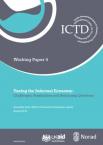ICTD Working Paper 27
Under the current system of separate accounting, tax-motivated international profit shifting results in misalignment of profits and real economic activity. While the Organisation for Economic Co-operation and Development (OECD) Base Erosion and Profit Shifting initiative aims to measure and curtail this, critics claim serious progress is only possible with greater emphasis on formulary apportionment methods (Picciotto 2013), or other methods outside the present international tax architecture (IMF 2014). In this paper we use the leading global database of company balance sheets to compare the distribution of profit and potential apportionment factors. Although data coverage is problematic for developing countries, we find that apportioning profit according to measures of actual economic activity would result in a major redistribution of the tax base at the expense of a particular group of jurisdictions, and in most cases towards the lower-income countries in the sample. International loss consolidation facilitated by a global switch to unitary taxation would reduce the overall tax base by around 12 per cent.
